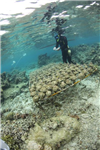The funding was awarded through EPA’s Office of Children’s Health Protection to reduce environmental exposures in homes, schools and childcare centers in underserved communities.
Plain, sloping roofs can collect up to 50 percent more rainwater than flat roofs with gravel.
City centers could become virtually car-free within the next 20 years under new plans proposed by University of Leeds transport researchers.
Researcher's solution, already instituted in more than 2,000 households and businesses in Mali, Uganda and Tanzania, involves shared micro-grids with prepaid metering.
Taking a cue from Mother Nature, researchers at the Department of Energy's BioEnergy Science Center have undertaken a first-of-its-kind study of a naturally occurring phenomenon in trees to spur the development of more efficient bioenergy crops.
Watering grass, whether in a park, a football field or a homeowner’s yard, was an issue throughout the summer as those responsible for upkeep tried to keep things green under drought conditions.
The Greenland ice sheet can experience extreme melting even when temperatures don't hit record highs, according to a new analysis by Dr. Marco Tedesco, assistant professor in the Department of Earth and Atmospheric Sciences at The City College of New York.
Carnegie Mellon’s green power purchase of more than 120 million kilowatt-hours (kWh) is equivalent to avoiding the yearly carbon dioxide (CO2) emissions of over 16,000 passenger vehicles or from more than 10,000 average American homes' electricity use.
Experts have been hard at work on an innovative future for reducing or preventing icing on airplanes using carbon nanotubes.
A new joint partnership provides a solution to the environmental issues surrounding the treatment of mineral-laden brackish water from Marcellus Shale drilling, a problem that has threatened to severely limit natural gas drilling in several northeastern states.
The U.S. Environmental Protection Agency (EPA) has declared Oct. 23-30, 2011 Lead Poisoning Prevention Week as part of the agency’s on-going efforts to make families aware of the hazards presented by lead and lead-based paint in the home and places where children under six years of age are regularly present.
Heat is an indispensable ingredient in each of those steps, and that's why large furnaces dot the assembly lines of all the solar cell manufacturers. The state of the art has been thermal or rapid-thermal-processing furnaces that use radiant or infrared heat to quickly boost the temperature of silicon wafers.
The average family spends $2,200 a year on energy bills, nearly half of which goes to heating and cooling
Water is a precious resource many take for granted until there is too little or too much. Scientists and engineers have positioned instruments at the Susquehanna Shale Hills Observatory at Pennsylvania State University to learn much more about the water cycle there. It is one of six Critical Zone Observatories in the United States.
This study, published in Environmental Science & Technology, suggests a possible connection to adverse health effects, including neurological diseases such as Alzheimer's.
Marine biologist Jo Wiszniewski has observed a fascinating approach to mating among the Port Stephens Indo-Pacific bottlenose dolphins.
Although the effects of change are well documented along the coast, where higher tides and ferocious storms have threatened native communities, a study by the U.S. Geological Survey (USGC) has found indigenous people in Alaska's interior also have felt the transformation to a warmer climate during the past several decades of their lifetimes.
The houses at 138 and 146 W. Foulke Ave. on the campus of The University of Findlay, Ohio, may look like “normal” student residences, but the students living in those houses chose to live there with a common goal to reduce energy consumption and to lower their carbon footprints.
The largest and most comprehensive study yet done on the effect of biofuel production from West Coast forests has concluded that an emphasis on bioenergy would increase carbon dioxide emissions from these forests at least 14 percent, if the efficiency of such operations is optimal.

A peer-reviewed study commissioned by NOAA shows the American people assign an estimated total economic value of $33.57 billion for the coral reefs of the main Hawaiian Islands.